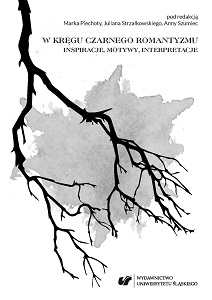O śmierci niecałkowitej i zemście zza grobu, czyli do czego może doprowadzić budowanie domu na cmentarzu. Grób rodziny Reichstalów Zygmunta Krasińskiego i Noc żywych Żydów Igora Ostachowicza
About incomplete death and revenge from beyond the grave, that is what building a house on a cemetery may bring about. „The tomb of the Reichstal family” by Zygmunt Krasinski and „The night of the living Jews” by Igor Ostachowicz
Author(s): Anna Rzepniewska-Kosińska
Subject(s): Language and Literature Studies, Studies of Literature, Polish Literature, Theory of Literature
Published by: Wydawnictwo Uniwersytetu Śląskiego
Summary/Abstract: The article is a comparative analysis of „The Tomb of the Reichstal” family by Zygmunt Krasiński and the novel „The night of living Jews” by the present-day author, Igor Ostachowicz. What is the basis for the comparison is the theme of an underground cemetery, which in the case of the Gothic novel is the family mausoleum founded by the lord of the house, whereas in the modern novel it is Warsaw cellars that are in fact the graves of thousands of those who were killed during the war of Jews and Poles. The buried in the vaults have a decisive influence on the fate of the living protagonists of both of the texts. The article proves that those living characters have been also affected by death. From the analysis of the category of non-fatal death, through the explication of the motives of posthumous revenge, what follows is the description of the consequences of building a house on the cemetery, which boil down to the domination of the world of the dead over the world of the living. Both novels have become exemplifications of early Romantic anthropology of death and its aporia overpowered by the thought of the Romanticism of the forties. The last part of the article has been devoted to late thoughts of Zygmunt Krasiński, who understood death as the proper beginning of human existence. In this context, the writing by Ostachowicz turns out a grotesque, radical development of the vision of the world of early Romanticism — as if no reevaluations of the Romanticism of the forties had taken place.
Book: W kręgu czarnego romantyzmu. Inspiracje, motywy, interpretacje
- Page Range: 165-192
- Page Count: 28
- Publication Year: 2018
- Language: Polish
- Content File-PDF

